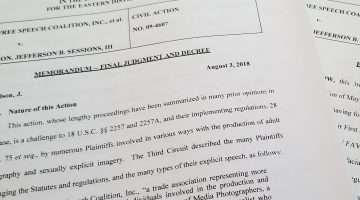 TORONTO – An article on IPOsgoode.com, a new site that explores legal governance issues at the intersection of intellectual property and technology, relates the case of Jackass.com, a domain that Viacom wanted to acquire for content related to it TV show “Jackass.”
TORONTO – An article on IPOsgoode.com, a new site that explores legal governance issues at the intersection of intellectual property and technology, relates the case of Jackass.com, a domain that Viacom wanted to acquire for content related to it TV show “Jackass.”
IPOsgoode.com is operated by Toronto-based Osgoode Hall Law School.
Viacom soon discovered that “a serial cybersquatter based in the Virgin Islands (owned by Future Media Architects) had beat them to it instead. In fact, it was discovered that the company had registered more than 100,000 domain names on words such as ‘jackass,’ most of which sites show at least a few pay-per-click ads.”
Originally Jackass.com was configured as an adult-entertainment site, according to the article, but the business model later changed. For six years, the domain has been used solely for pay-per-click ads, but the owners say they still have big plans.
“In fact, this group still has big dreams, wishing to convert its site into a website for donkeys and their contributions to society,” wrote Gargi Chopra, the author of the IPOsgoode.com article. “Seemingly, plans are underway and Future Media included a few pages of donkey website mockups in its response to the [World Intellectual Property Organization]-appointed panelist.”
After an evaluation by the WIPO panel, a decision was issued and Future Media was allowed to keep the domain. Viacom lost its bid to acquire Jackass.com.
According to Chopra, the WIPO’s decision reflects problems with the three-pronged test utilized by the Uniform Domain Name Dispute Resolution Policy.
“It does not seem prepared for changes in Internet practice,” Chopra wrote.
In such a case, the complainant (Viacom here) must demonstrate the domain was identical or confusingly similar to a trademark in which the complainant has rights. Then, the complainant must demonstrate the respondent did not have any legitimate interests with respect to the disputed name. Lastly, the complainant also must show the disputed name was registered and used in bad faith.
Viacom apparently fell short on the second and third prongs. Still, Chopra noted, “Even the WIPO panelist was not satisfied by all aspects of the respondent’s case and criticized the respondent for offering no explanation as to why it had taken so long to launch a donkey-themed website. The respondent also made absolutely no effort to explain why it suddenly wished to operate a website promoting donkeys and what benefit (if any) it would receive from pursuing this.”
Chopra believes the current resolution mechanism “is geared to catch the traditional cybersquatter, and not the more legal-minded or modern one.”
“At the very least,” he concluded, “this case provides us with a nice example of the need for law to keep up with changes in Internet practice, and to possibly shed some of its inherent retroactive character.”
The full article can be found here.











No Comment